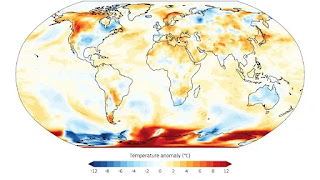 |
| This map shows the difference between Sunday's temperatures and the planet's average temperature (1991-2020). Data source: ERA5. - C3S/ECMWF |
It’s the second consecutive year average global temperatures have crashed through shocking climate records and will not be the last, as planet-warming fossil fuel pollution drives temperatures to shocking new highs.
July 21 clocked in at 17.09 degrees Celsius, or 62.76 Fahrenheit, and was the hottest day on Earth since at least 1940, according to the preliminary data from the European Union’s Copernicus Climate Change Service.
Global average temperatures typically peak during the Northern Hemisphere summer, between late June and early August.
By Angela Fritz.
Full story at Yahoo News.
No comments:
Post a Comment